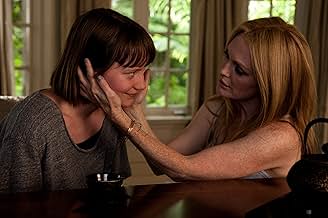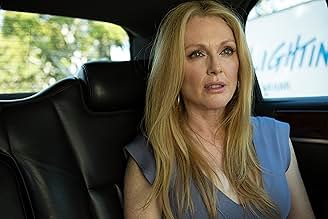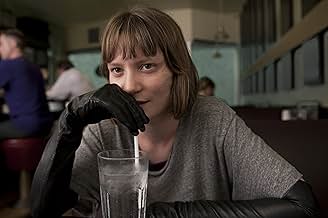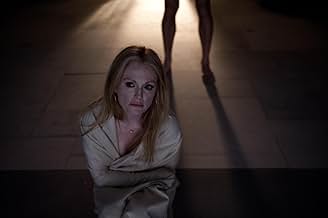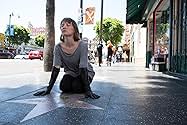IMDb रेटिंग
6.2/10
44 हज़ार
आपकी रेटिंग
अपनी भाषा में प्लॉट जोड़ेंA tour into the heart of a Hollywood family chasing celebrity, one another and the relentless ghosts of their pasts.A tour into the heart of a Hollywood family chasing celebrity, one another and the relentless ghosts of their pasts.A tour into the heart of a Hollywood family chasing celebrity, one another and the relentless ghosts of their pasts.
- पुरस्कार
- 10 जीत और कुल 24 नामांकन
फ़ीचर्ड समीक्षाएं
Probably the weirdest monster you'll come across this year, David Cronenberg's Map to the Stars is an odd animal full of wit, charm, and pure entertainment value. Definitely not for the faint of heart, but for those who love rich and layered characters, Cronenberg takes on Hollywood with zeal and humor. Some may classify the attempt as "mean," but no different from what Martin Scorsese brought to the table with The Wolf of Wall Street, a black comedy with a much deeper message is fully on display.
Bruce Wagner's script is a masterclass of writing. He finds all unique characters within our social existences and assembles them with stunning resolve. It's hard to believe the guy who wrote "A Nightmare on Elm Street 3: The Dream Warriors" could be capable of such a feat. We also get a subtle score by Howard Shore and stunning contemporary costumes by Denise Cronenberg. Not since The Devil Wears Prada has fashion felt like a separate character piece on a contemporary film set.
With no short of brilliance, the entire cast ignites some of their finest and most compelling works of their careers. It starts obviously with another powerhouse turn by four-time Academy Award nominee Julianne Moore. As "Havana Segrand," an actress dying for a big comeback, Moore illustrates her most vibrant and fruitful interpretation since "Cathy Whitaker" in Far from Heaven. Ferocious, daring, and completely involved, there's no other actress like Julianne Moore on this cinematic planet. Too good for words.
Everything seemed to finally click for actress Mia Wasikowska in her most daring performance to date. A ticking time bomb of emotion, her interpretation of "Agatha" is damn near close to terrifying. Robert Pattinson leaves all his "Twilight" days behind him and continues to evolve as a true performer. Cronenberg obviously knows what the heartthrob is capable of as he continues to use him frequently.
John Cusack and Olivia Williams are a match made in cinema hell, which secretly means heaven. Two people who are despicable together, the pair play insanely well off each other, showcasing luscious movements that all ring true. The young Evan Bird will have all of us learning his name by end credits. Lots of child stars make soft transitions in upbeat films like Little Miss Sunshine and Whale Rider. This is a brave and charismatic performance, channeling the aura of Justin Bieber (unfortunately just based on looks) but with tenacity as such performers as Ryan Gosling.
There are some tough pills to swallow during the viewing. There's incest, murder, "mean girl," moments, children dying which has characters happy to see it, it just doesn't seem to end. However, you will be entranced and placed under its spell from moment one. Cronenberg takes on subjects like violence and family with assurance. He's displayed this ability many times over in his filmmography. Map to the Stars stands tall with all the director's previous efforts.
Map to the Stars is not coy and completely confident in its demeanor. A well orchestrated and symbolic film that stands as one of the year's best films. This is Cronenberg's best effort since A History of Violence.
Bruce Wagner's script is a masterclass of writing. He finds all unique characters within our social existences and assembles them with stunning resolve. It's hard to believe the guy who wrote "A Nightmare on Elm Street 3: The Dream Warriors" could be capable of such a feat. We also get a subtle score by Howard Shore and stunning contemporary costumes by Denise Cronenberg. Not since The Devil Wears Prada has fashion felt like a separate character piece on a contemporary film set.
With no short of brilliance, the entire cast ignites some of their finest and most compelling works of their careers. It starts obviously with another powerhouse turn by four-time Academy Award nominee Julianne Moore. As "Havana Segrand," an actress dying for a big comeback, Moore illustrates her most vibrant and fruitful interpretation since "Cathy Whitaker" in Far from Heaven. Ferocious, daring, and completely involved, there's no other actress like Julianne Moore on this cinematic planet. Too good for words.
Everything seemed to finally click for actress Mia Wasikowska in her most daring performance to date. A ticking time bomb of emotion, her interpretation of "Agatha" is damn near close to terrifying. Robert Pattinson leaves all his "Twilight" days behind him and continues to evolve as a true performer. Cronenberg obviously knows what the heartthrob is capable of as he continues to use him frequently.
John Cusack and Olivia Williams are a match made in cinema hell, which secretly means heaven. Two people who are despicable together, the pair play insanely well off each other, showcasing luscious movements that all ring true. The young Evan Bird will have all of us learning his name by end credits. Lots of child stars make soft transitions in upbeat films like Little Miss Sunshine and Whale Rider. This is a brave and charismatic performance, channeling the aura of Justin Bieber (unfortunately just based on looks) but with tenacity as such performers as Ryan Gosling.
There are some tough pills to swallow during the viewing. There's incest, murder, "mean girl," moments, children dying which has characters happy to see it, it just doesn't seem to end. However, you will be entranced and placed under its spell from moment one. Cronenberg takes on subjects like violence and family with assurance. He's displayed this ability many times over in his filmmography. Map to the Stars stands tall with all the director's previous efforts.
Map to the Stars is not coy and completely confident in its demeanor. A well orchestrated and symbolic film that stands as one of the year's best films. This is Cronenberg's best effort since A History of Violence.
You would think that the soap operatic sentiments (incest, famous mothers, mysterious personal assistants, haughty child stars, and more) of Maps to the Stars would give it an enjoyably melodramatic edge, but instead of being an absurdly funny Hollywood satire, it mopes along with writhing cynicism until characters begin to set themselves on fire and get bludgeoned to death. The characters are nasty, the story lines are nasty, and so are the expensive furnishings; you probably haven't seen a Tinsel Town film this contemptuous, but you certainly have had better times at the movies before. The cynicism of Maps to the Stars is notable, but it becomes so increasingly dark that it goes from bracingly edgy to staunchly depressing. You wouldn't expect anything different from the macabre adoring David Cronenberg, but there might be a part of you that wishes we were lurking in the shadow of the soul sister of The Player instead of Debbie Downer's.
David Lynch got his kicks destroying the lives of the characters Naomi Watts and Laura Elena Harring played in Mulholland Dr., and Cronenberg has no trouble poisoning the wells the people in Maps to the Stars drink from. The Weiss family, who mirror the shameful dysfunction of the Spears' or the Lohan's, have slithered their way into Hollywood, but the scraggly hole they snuck in through is rapidly closing. Stafford Weiss (John Cusack) makes a living as a famed television psychiatrist with a starry clientèle, while his 13-year son (Evan Bird) is a successful child actor who headlines a shitty franchise when he's not residing in rehab. Christina, mother to Benjie and wife to Stafford, acts as her son's agent, clinging to his fame as she tries to find meaning in her empty, sad life.
Havana Segrand (Julianne Moore), one of Stafford's many patients, is an aging, irrelevant actress whose entire career has been overshadowed by her legendary mother (Sarah Gadon), who prematurely died in a house fire in the 1970s. Making her way into town is the enigmatic Agatha (Mia Wasikowska), a young woman with troubling burns on the side of her body; she finds a job as Havana's personal assistant, but her dangerous connection with the Weiss family leaves her slightly cursed.
If I've explained the plot well (and I probably haven't), then Maps to the Stars might sound enticing, carrying the same self-awareness of Twin Peaks while retaining the screeching satire of Sunset Boulevard. Wrong and wrong. I desperately wanted to like Maps to the Stars, (Julianne Moore and Mia Wasikowska are certainly two of Hollywood's most talented actresses and Cronenberg is a consistently interesting director), but it's much too unlikable to be anything other than dreary. The humor is sharp, but when humor is also underlined in a pen based in gloominess, it's hard to do anything other than remained sickened. The blame can't be placed on Cronenberg — his claustrophobic, fearlessly ghoulish filmmaking style is as fresh as ever — but on Wagner, whose screenplay wants to be sardonic but eventually runs out of ideas. The ending, which is essentially a series of disturbing character offings, seems like an act of haste instead of a necessity.
But if Maps to the Stars isn't as delicious as I wish it was, it never stops being watchable, in part to the cast (a round-table of fantastic performances) and in part to Cronenberg's unwaveringly creepy handling of it all. It isn't necessarily a horror film, but there's always a part of us that twitches in fear that something bad will happen. Bad stuff unavoidably does happen; I just wish the negativity was more creative. But if the woods are lovely, dark, and deep and you've got promises to maintain your derisive mood, Maps to the Stars might contain just enough pessimism to toot your raincloud drenched horn.
Read more reviews at petersonreviews.com
David Lynch got his kicks destroying the lives of the characters Naomi Watts and Laura Elena Harring played in Mulholland Dr., and Cronenberg has no trouble poisoning the wells the people in Maps to the Stars drink from. The Weiss family, who mirror the shameful dysfunction of the Spears' or the Lohan's, have slithered their way into Hollywood, but the scraggly hole they snuck in through is rapidly closing. Stafford Weiss (John Cusack) makes a living as a famed television psychiatrist with a starry clientèle, while his 13-year son (Evan Bird) is a successful child actor who headlines a shitty franchise when he's not residing in rehab. Christina, mother to Benjie and wife to Stafford, acts as her son's agent, clinging to his fame as she tries to find meaning in her empty, sad life.
Havana Segrand (Julianne Moore), one of Stafford's many patients, is an aging, irrelevant actress whose entire career has been overshadowed by her legendary mother (Sarah Gadon), who prematurely died in a house fire in the 1970s. Making her way into town is the enigmatic Agatha (Mia Wasikowska), a young woman with troubling burns on the side of her body; she finds a job as Havana's personal assistant, but her dangerous connection with the Weiss family leaves her slightly cursed.
If I've explained the plot well (and I probably haven't), then Maps to the Stars might sound enticing, carrying the same self-awareness of Twin Peaks while retaining the screeching satire of Sunset Boulevard. Wrong and wrong. I desperately wanted to like Maps to the Stars, (Julianne Moore and Mia Wasikowska are certainly two of Hollywood's most talented actresses and Cronenberg is a consistently interesting director), but it's much too unlikable to be anything other than dreary. The humor is sharp, but when humor is also underlined in a pen based in gloominess, it's hard to do anything other than remained sickened. The blame can't be placed on Cronenberg — his claustrophobic, fearlessly ghoulish filmmaking style is as fresh as ever — but on Wagner, whose screenplay wants to be sardonic but eventually runs out of ideas. The ending, which is essentially a series of disturbing character offings, seems like an act of haste instead of a necessity.
But if Maps to the Stars isn't as delicious as I wish it was, it never stops being watchable, in part to the cast (a round-table of fantastic performances) and in part to Cronenberg's unwaveringly creepy handling of it all. It isn't necessarily a horror film, but there's always a part of us that twitches in fear that something bad will happen. Bad stuff unavoidably does happen; I just wish the negativity was more creative. But if the woods are lovely, dark, and deep and you've got promises to maintain your derisive mood, Maps to the Stars might contain just enough pessimism to toot your raincloud drenched horn.
Read more reviews at petersonreviews.com
Anyone worried that a David Cronenberg film about the inner workings of Hollywood would not be filled with copious amounts of ick, rest assured. The ick abounds in "Maps to the Stars," a fascinating film that must be something like what watching a grisly car accident in slow motion would feel like.
Julianne Moore won her Oscar for the bland and award-bait "Still Alice" last year, but THIS is the movie for which she should have won. Utterly lacking in vanity, Moore tears into the role of a washed up actress struggling night and day to stage her comeback. Think Norma Desmond without the black and white studio sheen of "Sunset Boulevard" and the filters that were necessarily in place back when Billy Wilder's dark satire was released. This film is like rummaging through Norma Desmond's underwear. Mia Wasikowska is great as well as Moore's hanger on and personal assistant who unravels and goes off the deep end and beyond. Swirling around these two characters are plot lines involving a troubled child star, lots and lots of incest, and enough frantic desperation to fill a sequel to "Mulholland Drive."
Whenever I see a movie like this, I immediately wonder how true it is vs. how exaggerated for effect. For example, did Halle Berry or Nicole Kidman at one point in their careers have to subject themselves to the indignities shown or implied in this film? But then I think there has to be a lot of truth to movies like this, "Mulholland Drive," etc., which makes me glad I decided to be an anonymous Joe as opposed to a superstar. For every Julia Roberts, there are hundreds, maybe thousands, of desperate people out there waiting for the big break that will never come, or who can't handle it when it eventually does.
Grade: A-
Julianne Moore won her Oscar for the bland and award-bait "Still Alice" last year, but THIS is the movie for which she should have won. Utterly lacking in vanity, Moore tears into the role of a washed up actress struggling night and day to stage her comeback. Think Norma Desmond without the black and white studio sheen of "Sunset Boulevard" and the filters that were necessarily in place back when Billy Wilder's dark satire was released. This film is like rummaging through Norma Desmond's underwear. Mia Wasikowska is great as well as Moore's hanger on and personal assistant who unravels and goes off the deep end and beyond. Swirling around these two characters are plot lines involving a troubled child star, lots and lots of incest, and enough frantic desperation to fill a sequel to "Mulholland Drive."
Whenever I see a movie like this, I immediately wonder how true it is vs. how exaggerated for effect. For example, did Halle Berry or Nicole Kidman at one point in their careers have to subject themselves to the indignities shown or implied in this film? But then I think there has to be a lot of truth to movies like this, "Mulholland Drive," etc., which makes me glad I decided to be an anonymous Joe as opposed to a superstar. For every Julia Roberts, there are hundreds, maybe thousands, of desperate people out there waiting for the big break that will never come, or who can't handle it when it eventually does.
Grade: A-
Hollywood never looks to kindly at itself when doing films about the lives of folks who make movies. But the Weiss family in Maps To The Stars are a really outstanding collection of freaks and weirdos.
Meet the Weisses. Father is John Cusack who is one of those self help promoting gurus making a fast buck on the lecture circuit and writing. His wife Olivia Williams is hardly a stay at home mom, she's out managing the career of their son Evan Bird who after time in a rehab is looking to make a comeback as a teen. That in itself is a sad new Hollywood tradition. From the time of Jackie Coogan child stars who emerge as chief breadwinners in their families have had unique and tragic stories. Bird gives his parents standing that they might never acquire on their own at the cost of a faintly normal childhood.
There's a fourth Weiss, another child played by Mia Wasikowska whose arrival by train sets the stage for the story. She's ordered a limousine and has the money to pay for it. Wasikowska chats up the driver, a hunky aspiring actor himself played by Robert Pattinson.
As the story unfolds we learn that Wasikowska has been living in Florida in an asylum, put there by her family after she set a fire. All this done with the prime object of keeping news of it away from the tabloid press. Can't have her brother's career and her father's racket be the subject of scandal.
Carrie Fisher makes a brief appearance as herself and Wasikowska has struck up a relationship with her via the Internet. Probably looking to palm off an eager, but obtrusive fan she suggest that actress Julianne Moore take her on as a 'personal assistant'.
Moore is a piece of work herself. She's a great lesson that Bird might not have the maturity to comprehend. It's the direction he's well on the way to. A totally self absorbed, self indulgent creature who thinks the whole world revolves around her. She's obsessed with playing her mother who was a great star who died in a fire like Linda Darnell back in the day. In her own imaginings she talks with her mother who puts her down for not having the talent to back up the ego.
Bird who is a Moore in training also has visions. His visitor is a little girl who was terminally ill whom he made a hospital visit for. No doubt he cheered her up in those last hours, but his psyche knows that maybe she sees him for what he is. Bird is also bright enough to see the path he's on, but can't do anything about it.
I suppose a certain amount of narcissism in show business is necessary to succeed. But Maps To The Stars is an ode to narcissism like I've never seen before on the big screen.
If I had to pick out someone who stood out in Maps To The Stars for me it's Evan Bird. I hope he's nothing like his character in the film in real life because anyone who's got to associate with him is in for one bumpy ride. But God only knows he's got any number of examples in real life to have studied for this role.
Another nasty bit of self analysis Maps To The Stars from Tinseltown.
Meet the Weisses. Father is John Cusack who is one of those self help promoting gurus making a fast buck on the lecture circuit and writing. His wife Olivia Williams is hardly a stay at home mom, she's out managing the career of their son Evan Bird who after time in a rehab is looking to make a comeback as a teen. That in itself is a sad new Hollywood tradition. From the time of Jackie Coogan child stars who emerge as chief breadwinners in their families have had unique and tragic stories. Bird gives his parents standing that they might never acquire on their own at the cost of a faintly normal childhood.
There's a fourth Weiss, another child played by Mia Wasikowska whose arrival by train sets the stage for the story. She's ordered a limousine and has the money to pay for it. Wasikowska chats up the driver, a hunky aspiring actor himself played by Robert Pattinson.
As the story unfolds we learn that Wasikowska has been living in Florida in an asylum, put there by her family after she set a fire. All this done with the prime object of keeping news of it away from the tabloid press. Can't have her brother's career and her father's racket be the subject of scandal.
Carrie Fisher makes a brief appearance as herself and Wasikowska has struck up a relationship with her via the Internet. Probably looking to palm off an eager, but obtrusive fan she suggest that actress Julianne Moore take her on as a 'personal assistant'.
Moore is a piece of work herself. She's a great lesson that Bird might not have the maturity to comprehend. It's the direction he's well on the way to. A totally self absorbed, self indulgent creature who thinks the whole world revolves around her. She's obsessed with playing her mother who was a great star who died in a fire like Linda Darnell back in the day. In her own imaginings she talks with her mother who puts her down for not having the talent to back up the ego.
Bird who is a Moore in training also has visions. His visitor is a little girl who was terminally ill whom he made a hospital visit for. No doubt he cheered her up in those last hours, but his psyche knows that maybe she sees him for what he is. Bird is also bright enough to see the path he's on, but can't do anything about it.
I suppose a certain amount of narcissism in show business is necessary to succeed. But Maps To The Stars is an ode to narcissism like I've never seen before on the big screen.
If I had to pick out someone who stood out in Maps To The Stars for me it's Evan Bird. I hope he's nothing like his character in the film in real life because anyone who's got to associate with him is in for one bumpy ride. But God only knows he's got any number of examples in real life to have studied for this role.
Another nasty bit of self analysis Maps To The Stars from Tinseltown.
A film worth revisiting, if my experience is anything to go by. I didn't think it was up to much the first time, but the BBC put it on again and this time I watched it twice and probably will at least once more, partly for Julianne Moore, who's pretty astonishing, playing an almost unprecedentedly monstrous grotesque, and partly for the frequent patches of brilliantly written dialogue (take a bow, Bruce Wagner). Moore's dialogue is almost always good, but that of 13-year-old move star and recovering drug abuser Benji also packs a vicious punch, and elsewhere, more subtly, in the mouths of Mia Wasikovska and Robert Pattinson's characters, Wagner does probably the best depiction I've ever seen of how young adults actually talk a lot of the time: confused, insecure and just barely covering it up.
All this is something like what we might see - and most importantly hear - if anyone ever filmed a Brett Eason Ellis novel properly, without being afraid of going to town on the dialogue (why hasn't Cronenburg ever worked with Ellis?). As such, it's an interesting point of comparison with Cronenburg's previous film, Cosmopolis, also heavy on the chilly, anomic modern rich person dialogue, courtesy of Don de Lillo, which, taken on its own, looks like woefully pretentious proof that you can't do this in film. Turns out you can, with bells on, though actually, Cronenburg films have been demonstrating this at least since Dead Ringers.
Other than these talky highlights, I think this film has a few problems of its own, some of them maybe also around pretentiousness. The big one for me is just the messiness of the message and plot, as a unity, which it isn't really. Moore's storyline on its own is a perfect, pitilessly poisonous Hollywood satire. Does it really need, in addition, a parallel plot that never quite meshes about incest and schizophrenia? Why? To round it out to feature film length? To give it some spurious intellectual heft in the form of references to Greek tragedy and elemental symbolism?
To be honest, there may be a puzzle here that I haven't worked out, because quite a lot of that dialogue I like so much seems to be satirising precisely such tendencies, particularly when Moore's character ghoulishly invokes fire and water to implicitly celebrate the death of a child because it gets her a part. And that's another reason I might watch again. But still, the problem remains, I don't think you need the incest or the schizophrenia to satirise Hollywood, because it introduces a sort of separate issue, a distinct emotional antagonist if you will, where Hollywood itself seems like the real target and should surely be all you need to explain all this very bad behaviour.
All this is something like what we might see - and most importantly hear - if anyone ever filmed a Brett Eason Ellis novel properly, without being afraid of going to town on the dialogue (why hasn't Cronenburg ever worked with Ellis?). As such, it's an interesting point of comparison with Cronenburg's previous film, Cosmopolis, also heavy on the chilly, anomic modern rich person dialogue, courtesy of Don de Lillo, which, taken on its own, looks like woefully pretentious proof that you can't do this in film. Turns out you can, with bells on, though actually, Cronenburg films have been demonstrating this at least since Dead Ringers.
Other than these talky highlights, I think this film has a few problems of its own, some of them maybe also around pretentiousness. The big one for me is just the messiness of the message and plot, as a unity, which it isn't really. Moore's storyline on its own is a perfect, pitilessly poisonous Hollywood satire. Does it really need, in addition, a parallel plot that never quite meshes about incest and schizophrenia? Why? To round it out to feature film length? To give it some spurious intellectual heft in the form of references to Greek tragedy and elemental symbolism?
To be honest, there may be a puzzle here that I haven't worked out, because quite a lot of that dialogue I like so much seems to be satirising precisely such tendencies, particularly when Moore's character ghoulishly invokes fire and water to implicitly celebrate the death of a child because it gets her a part. And that's another reason I might watch again. But still, the problem remains, I don't think you need the incest or the schizophrenia to satirise Hollywood, because it introduces a sort of separate issue, a distinct emotional antagonist if you will, where Hollywood itself seems like the real target and should surely be all you need to explain all this very bad behaviour.
क्या आपको पता है
- ट्रिवियाAccording to screenwriter Bruce Wagner, the casting of Robert Pattinson was what finally got the movie made, financially speaking.
- गूफ़When Jerome is driving Havana, they are in a long wheelbase 'L' version of Lincoln Town Car, when they've arrived at her house and are having sex in the back, they are in a standard wheelbase version (it has a shorter quarter glass section in the rear door window).
- भाव
Agatha Weiss: [Agatha recites poetry from Paul Éluard's poem, Liberty, translated from French] On my school notebook, on my desk and the trees, on the sand and the snow, I write your name. On all the flesh that says yes, on the forehead of my friends, on every hand held out, I write your name. Liberty.
- कनेक्शनFeatured in Renegade Cut: Maps to the Stars (2015)
- साउंडट्रैकNa Na Hey Hey Kiss Him Goodbye
Written by Gary DeCarlo,Paul Leka and Dale Frashuer
Performed by Julianne Moore and Mia Wasikowska
टॉप पसंद
रेटिंग देने के लिए साइन-इन करें और वैयक्तिकृत सुझावों के लिए वॉचलिस्ट करें
- How long is Maps to the Stars?Alexa द्वारा संचालित
विवरण
- रिलीज़ की तारीख़
- कंट्री ऑफ़ ओरिजिन
- आधिकारिक साइट
- भाषा
- इस रूप में भी जाना जाता है
- Mapa a las estrellas
- फ़िल्माने की जगहें
- उत्पादन कंपनियां
- IMDbPro पर और कंपनी क्रेडिट देखें
बॉक्स ऑफ़िस
- बजट
- $1,50,00,000(अनुमानित)
- US और कनाडा में सकल
- $3,50,741
- US और कनाडा में पहले सप्ताह में कुल कमाई
- $1,43,422
- 1 मार्च 2015
- दुनिया भर में सकल
- $45,10,934
- चलने की अवधि1 घंटा 51 मिनट
- रंग
- ध्वनि मिश्रण
- पक्ष अनुपात
- 1.85 : 1
इस पेज में योगदान दें
किसी बदलाव का सुझाव दें या अनुपलब्ध कॉन्टेंट जोड़ें







